We celebrate the class of 2024 and the impact they’ve had on each other, our campus community and beyond! A few of our UW School of Medicine and Public Health (SMPH) graduates shared some of the most meaningful aspects of their time at UW, as well as what they hope to accomplish in the future.
-
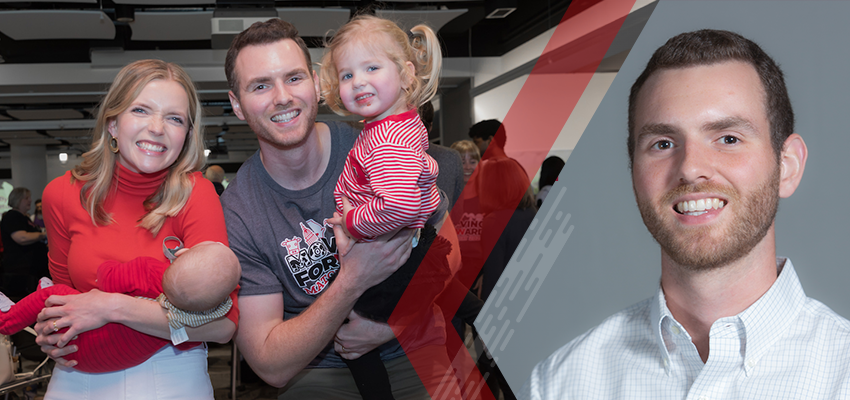
Noah Trapp celebrates his residency match at Mayo Clinic with his wife and two children
Noah Trapp
Doctor of Medicine, UW School of Medicine and Public Health
BS, Biology, Kansas State University
Noah Trapp chose to work as a science teacher and eighth-grade baseball coach deep in the Mississippi Delta because he wanted to go where he was needed. While teaching in 2017, he witnessed the inequities his students faced in the classroom and struggled with the knowledge that they faced some of the worst health outcomes in the country. This week, Noah graduates from medical school and will begin a residency in pediatric neurology at Mayo Clinic. He says it’s a specialty at the intersection of what he loves: helping children and their families through some of the biggest challenges of their lives, which also allows him to continuously learn and focus on how brains adapt.
At UW, Noah participated in the global health program, took a research year to help establish a new lab evaluating neurological outcomes in children with perinatal brain injury and won a research award from the Wisconsin Neurological Society. He also founded a student interest group in neurology and volunteered through the MEDiC free clinic, all while he and his wife welcomed two children into their lives.
When asked what he hopes to take from UW, Noah shares it will be to find a place that models what he found here. He wants to work in an academic medical center to provide patient care, incorporate his interest in global health in neuroinfectious disease and find a way to teach. He jokes it is probably not possible to be an 8th-grade teacher who practices medicine on the side, which speaks to his desire to continue to teach the next generation of health care leaders.
Congratulations, Noah!
-
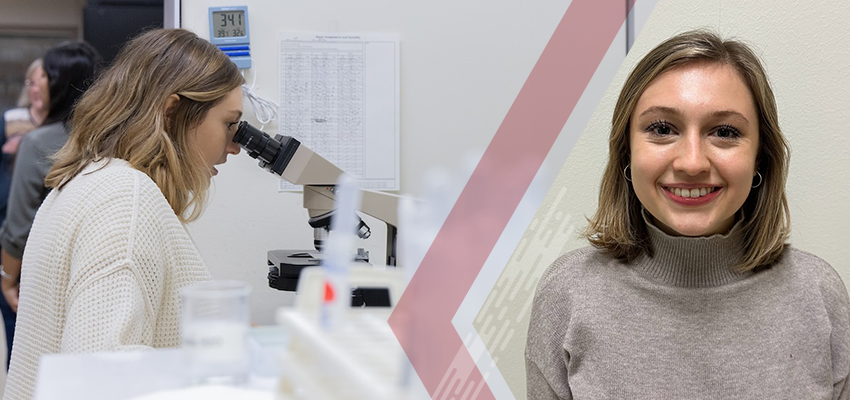
Isabella Holland looks at chromosomes using a microscope during a class visit to the State Lab of Hygiene’s cryogenics lab
Isabella Holland
Master of Genetic Counselor Studies, UW School of Medicine and Public Health
BS, Genetics, University of Iowa
Isabella Holland has embraced what she calls the unique aspects of the Master of Genetic Counselor Studies (MGCS) program. She says the program fosters supplemental and enriching experiences and activities, while also delivering the key foundational attributes needed to be a successful genetic counselor.
She was able to incorporate her passion for community outreach by developing a genetics-related activity for children, which she and another classmate introduced in a Spanish immersion classroom at a local elementary school. To expand her experiences, she also pursued an optional summer internship with Myriad Genetics, a genetic testing lab in Salt Lake City, UT. There she worked with multiple teams in varied roles to learn about emerging topics in reproductive and oncology genetics.
Isabella completed her second-year clinical through the Marshfield clinical track, conducting her clinical rotations with the Marshfield Clinic Medical Genetics Service, completing coursework via distance education platforms, and performing a research project. While in Marshfield, she worked as a genetic counseling assistant on the phenome team at PreventionGenetics, a genetic testing laboratory in Marshfield, WI.
After graduation, Isabella will begin work as a clinical genetic counselor at the John Stoddard Cancer Center in Des Moines, Iowa — seeing patients from a variety of different specialties with a primary focus on oncology. She hopes to implement public outreach projects, such as collaborating with other genetic counselors and organizations to create educational resources for patients, to increase access to genetic knowledge for both patients and other health care providers.
She shares how grateful she is to have been a part of what she calls a truly phenomenal program.
Congratulations to Isabella, who is one of eight 2024 graduates of the Master of Genetic Counselor Studies Program!
-
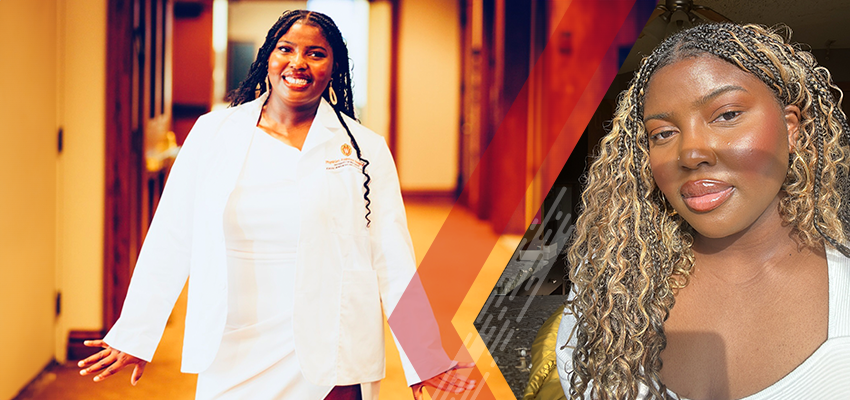
Addie Agboola in her physician assistant white coat
Addie Agboola
Master of Physician Assistant Studies, UW School of Medicine and Public Health
BA. Biology, Society and Environment, University of Minnesota
Aderoju (Addie) Agboola was completing a senior thesis in molecular medicine when a reading on Black maternal mortality stopped her in her tracks, causing her to reassess her view of health care, representation and her role in it. As a Black woman, she also struggled to find a health care provider that looked like her. So just like that, she says, she decided to become one.
Addie is a first-generation Nigerian American, and Aderoju, her given name in Yoruba — the language of her tribe — means to aid in times of great suffering and to help those in need.
She chose to pursue a Physician Assistant degree because of its versatility and alignment with her interests, from primary care and addiction medicine to neonatal care. Most importantly, she says that when patients who look like her walk into an exam room, she feels there are some things they won’t have to explain because they will feel understood.
Addie chose UW because she could tell the organization cared about her “why” — helping students understand who they are, why they are seeking the degree and what they hope to contribute. She says friendships and peer support helped her grow more than she expected and made the challenging process of becoming a PA truly fun.
Addie shares she is interviewing for positions at federally qualified health centers to start a career in primary care. Her goal is to be the type of provider that all patients trust, honoring the individuality that exists for all patients. “I want to be all the things I looked desperately for in my providers,” Addie says. “I want to cultivate a space for patients to feel like they matter, to feel that their choices are respected regardless of if they align with mine.”
We congratulate Addie and the entire class of 56 Physician Assistant graduates!
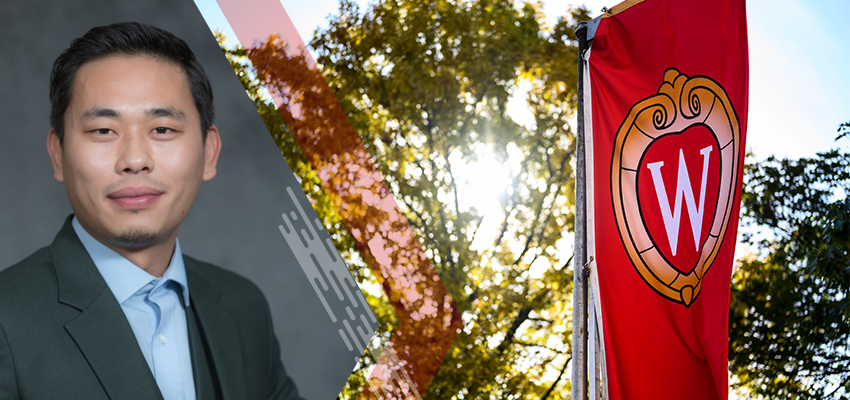
Tenzin Phuntsok
Master of Science, Biotechnology, University of Wisconsin–Madison
BS, Zoology, University of Delhi
MS, Applied Microbiology, Banaras Hindu
When the academic rigor of the Master of Science in Biotechnology program got especially challenging, Tenzin Phuntsok would call his mother in India to gain inspiration. As a young girl, his mother fled the Chinese occupation of Tibet with her family, trekking barefoot across the Himalayas. Later, in the eighth grade, she was forced to drop out of school to care for her bedridden parents.
“She loved to learn, so it was a very, very difficult time for her,” Tenzin says. “To this day, she is a strong advocate of education. She believes that if you are given the opportunity to study, you should do so without complaint.” Tenzin’s success is a testament to his family’s sacrifices – and to the special efforts of the MS in Biotechnology program. We congratulate the entire class of 2024, 26 graduates who continue their work in regional biotech companies in Wisconsin.
More on his story from University Communications
-
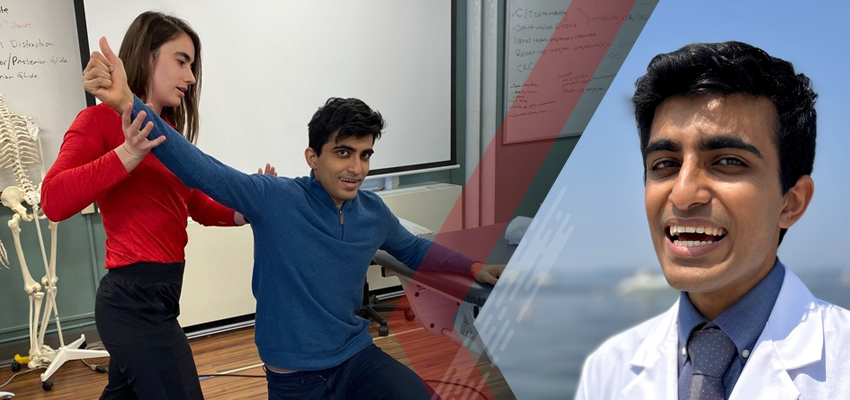
Muzzy Chaudhry practices physical therapy techniques with a fellow student during class
Muzammil (Muzzy) Chaudhry
Doctorate of Physical Therapy, UW School of Medicine and Public Health
BS, Human Development and Family Studies, UW–Madison
Empowering patients to heal themselves through movement and reconnect with activities that bring them joy is what drew Muzammil (Muzzy) Chaudhry to the school’s Doctor of Physical Therapy program. He says he is passionate about orthopedics and applying psychosocial strategies to health care to help patients experience the best outcomes possible.
Originally from Chicago, Muzzy attended UW–Madison for a bachelor’s degree in human development and family studies, which gave him a strong foundation for building deep relationships with patients and cultivating empathy. He says it also gave him a strong sense of the incredible support systems available at the university, adding that the physical therapy program has introduced him to wonderful faculty and peers, which cultivated an amazing learning experience.
One of his most meaningful experiences was creating a course focused on empathy in health care called Cultural Humility for Health Equity, which he then offered to all UW School of Medicine and Public Health students. “This cause is important to me because health disparity research shows that we, the providers, can cause considerable negative patient experiences,” he explains. “It is clear that more needs to be done to understand the experiences of our diverse populace. We covered important topics such as media bias, weight bias and more. It was such a pleasure to learn about the stories of my fellow students and grow together as a group.”
After graduation, Muzzy is joining Mayo Clinic for an orthopedic residency and is excited to continue to learn and grow his knowledge of orthopedic conditions and help teach. “My dream is to split my time between being an orthopedic clinician and teaching both orthopedics and empathy coursework at a university,” he says. “I chose physical therapy because of our ability to build strong patient connections. It is fulfilling to empower patients to heal themselves through movement and reconnect them with the parts of their lives they love the most.”
Join us in congratulating the 38 graduates of the Doctor of Physical Therapy program!
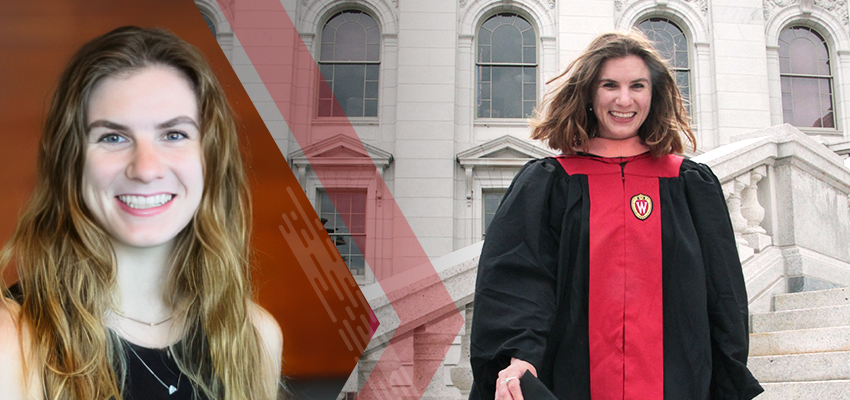
Kathryn Anderson
Master of Public Health, UW School of Medicine and Public Health
BSN, UW–Madison
Certificates in Leadership and Global Health
Kathryn Anderson had just completed three 12-hour overnight shifts when asked to reflect on her experiences pursuing a Master of Public Health (MPH) degree. Kathryn is currently working full-time as a registered nurse on a medical/surgical/oncology floor at Mayo Clinic Health Systems in Eau Claire, WI. She also travels to UW twice a week to finalize coursework and requirements for the Nursing to Master of Public Health program.
“UW is known for its innovation and pushing the boundaries of society,” Kathryn shares. “I came here to pursue what is beyond the ‘norm.'”
This dual degree MPH program allowed Kathryn to complete her undergraduate degree (BSN with Certificates in Leadership and Global Health) and then transition to the MPH program. Kathryn feels everyone studying clinical medicine should also have a thorough understanding of preventive medicine and public health. Program mentors share how Kathryn’s genuine desire to merge public health and medicine in her career embodies what the UW School of Medicine and Public Health is all about.
One area where Kathryn is working to impact public health is through a community-based project with the Wisconsin Association of Local Health Departments and Boards. Since 2020, more than 50% of the local leaders in health departments are new, with attrition in part linked to the impact of the pandemic. Kathryn’s project focuses on a comprehensive assessment of the educational and skill-based needs of all levels of directors at local health departments. The results and recommendations from this project are expected to help departments seek funding and develop a curriculum to prepare Wisconsin’s next generation of local health department leaders.
Kathryn’s goal is for health to be accessible. She sees health and healthy living as a right for all. “It is my goal to empower as many people as possible to work toward their health and their higher goals.”
Recently, Kathryn decided to pursue a new goal — her next career step is to apply to medical school so she can bring her public health lens to patients every day.
We congratulate the graduates of the Master of Public Health Program!